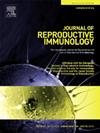Active immunization against gonadotropin-releasing hormone enhances the generation of B cells but does not affect their colonization in peripheral immune organs in male rats
IF 2.9
3区 医学
Q3 IMMUNOLOGY
引用次数: 0
Abstract
Active immunization against gonadotropin-releasing hormone (GnRH) affects the immune system by inhibiting testosterone production. Our previous study investigated the effects of GnRH immunization on thymic T-cell generation, migration, and colonization in peripheral immune organs. However, the mechanisms by which GnRH immunization influences B cell generation and the characteristics of B cell colonization in peripheral immune organs remain unclear. Herein, GnRH immunization enhanced B cell generation by reducing apoptosis. GnRH immunization did not markedly affect the cell cycle of bone marrow cells, B cell development-related signaling molecules, or the percentage of B cells in the blood, spleen, or inguinal lymph nodes. After testosterone supplementation in GnRH-immunocastrated rats, the generation of B cells in the bone marrow was significantly reduced, and the apoptosis of B cells was remarkably increased. Testosterone did not significantly affect the cell cycle of bone marrow cells or the proportion of B cells in the blood, spleen, or inguinal lymph nodes of the GnRH-immunocastrated rats. Overall, these results clarify the mechanisms related to B cell expansion in the bone marrow and the settlement characteristics of B cells in peripheral immune organs after GnRH immunization.
主动免疫促性腺激素释放激素可增强雄性大鼠外周血免疫器官中B细胞的生成,但不影响其定植。
针对促性腺激素释放激素(GnRH)的主动免疫通过抑制睾丸激素的产生来影响免疫系统。我们之前的研究调查了GnRH免疫对胸腺t细胞在周围免疫器官的产生、迁移和定植的影响。然而,GnRH免疫影响B细胞生成的机制和B细胞在外周免疫器官定植的特点尚不清楚。在这里,GnRH免疫通过减少细胞凋亡来增强B细胞的生成。GnRH免疫对骨髓细胞的细胞周期、B细胞发育相关信号分子或血液、脾脏或腹股沟淋巴结中B细胞的百分比没有显著影响。gnrh免疫去势大鼠补充睾酮后,骨髓中B细胞的生成明显减少,B细胞的凋亡明显增加。睾酮对gnrh免疫去势大鼠骨髓细胞周期及血液、脾脏、腹股沟淋巴结B细胞比例无显著影响。总的来说,这些结果阐明了GnRH免疫后B细胞在骨髓中扩增的相关机制以及B细胞在外周免疫器官中的沉降特征。
本文章由计算机程序翻译,如有差异,请以英文原文为准。
求助全文
约1分钟内获得全文
求助全文
来源期刊
CiteScore
6.30
自引率
5.90%
发文量
162
审稿时长
10.6 weeks
期刊介绍:
Affiliated with the European Society of Reproductive Immunology and with the International Society for Immunology of Reproduction
The aim of the Journal of Reproductive Immunology is to provide the critical forum for the dissemination of results from high quality research in all aspects of experimental, animal and clinical reproductive immunobiology.
This encompasses normal and pathological processes of:
* Male and Female Reproductive Tracts
* Gametogenesis and Embryogenesis
* Implantation and Placental Development
* Gestation and Parturition
* Mammary Gland and Lactation.

 求助内容:
求助内容: 应助结果提醒方式:
应助结果提醒方式:


